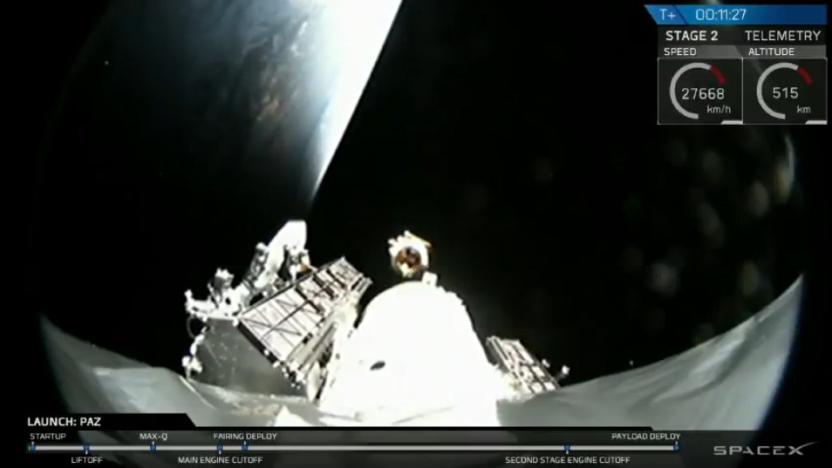internetsatellite
Latest

China launches a rocket from a ship for the first time
China has joined the US and Russia as the only nations to have successfully launched a rocket at sea. The National Space Administration's Long March 11 took off from a launchpad on a ship in the Yellow Sea today. The rocket carried five commercial satellites (including two for a company that plans to set up a global network of internet satellites) and two research-focused experimental ones.

Amazon plans to launch thousands of internet satellites
Amazon wants to launch thousands of low Earth orbit satellites to offer internet connection across the planet. With Project Kuiper, it aims to deploy 3,236 satellites to cover areas where about 95 percent of the global population live. Details otherwise are scant so far, including the estimated timeline for bringing the network online or how much the project will cost. Amazon confirmed the plans after GeekWire unearthed filings for it.

SpaceX gets FCC approval to deploy thousands more internet satellites
SpaceX's plan to build a global, high-speed wireless internet network using satellites has taken another step forward. The FCC approved the company's request to deploy more than 7,000 very-low-Earth orbit satellites for its Starlink network. It follows the regulator giving SpaceX the green light in March to launch 4,425 satellites.

SpaceX successfully launches Falcon 9 carrying internet satellites
SpaceX successfully launched another Falcon 9 rocket today carrying Spain's radar imaging Paz satellite as well as two of its own satellites, Microsat-2a and -2b. The two experimental satellites will be used to test SpaceX's plan to deliver internet to people around the globe through thousands of low-orbit satellites.

Apple fills new hardware team with ex-Google satellite execs
Apple has hired two people with intriguing backgrounds in the field of satellite technology: John Fenwick, the former head of Google's spacecraft business, and Michael Trela, the ex-lead of Google's satellite engineering group. Bloomberg reports the hires, citing people familiar with the matter.

WSJ: Elon Musk wants to bring the whole world online with affordable satellites
Small, low-cost internet satellites that provide affordable internet to everyone on the planet. These are what Elon Musk wants to create next after working on reusable rockets, space capsules and electric cars since the early 2000's, according to The Wall Street Journal. The publication says Musk is in the early stages of collaborating with Greg Wyler, who founded O3b Networks and led Google's internet satellite venture until earlier this year. The duo (with Wyler now representing WorldVu, a company he also founded recently) apparently plans to launch a total of 700 internet satellites into space. They want each of those satellites to cost less than $1 million to build and to weigh less than 250 pounds -- a huge undertaking, seeing as the smallest models these days cost several millions and weigh at least 500 pounds.

O3b satellites to enable connectivity for the world's "other 3 billion"
If you thought Verizon was taking its sweet time rolling out FiOS to your neighborhood, imagine how long it would take to connect the entire continent of Africa. Verizon wouldn't bother trying, but satellite company O3b, in partnership with Google, is doing just that. The pair plan to bathe that continent (and others) with soothing Internet waves via 16 medium-earth orbit (MEO) units. Latency is said to be only 120 milliseconds, with maximum download speeds at 1.25Gbps. That's seriously fast, about the same as Japan's Kizuna (set to cover disconnected Asian regions), but before you cancel your 1.5Mbps WildBlue account and go on a bandwidth safari know that these new orbital hotspots are destined to act as backbones for use by smaller ISPs. They'll in turn provide wireless access direct to customers over 3G or WiMax, throttling things appropriately. [Via ZDNet Government]

Japan launches Kizuna satellite, hopes it will deliver high-speed internet
Granted, most of us here in America would turn our noses up at receiving in-home broadband via satellite -- after all, cable and DSL seem to be treating most of us quite alright -- but Japan is hoping to provide access to more regions in Asia-Pacific with its recently launched Kizuna. The experimental satellite is not yet intended for commercial use, but if all goes well, it will enable data transmissions "of up to 1.2 gigabytes per second" at a low cost across Japan and 19 other locales in Southeast Asia. Unfortunately, we've no idea when it will escape the bondage of testing and actually be put to good use, but at least Japan's well on its way to actually establishing that wireless island, eh?[Via CNN, thanks to everyone who sent this in]





